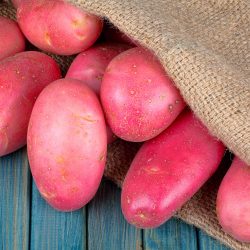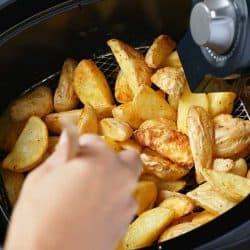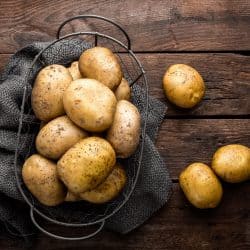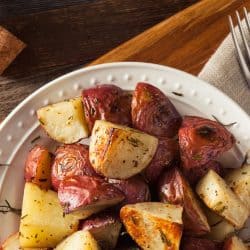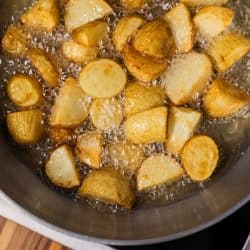If you want to make a popular snack on your own at home, consider homemade potato chips. This snack can be prepared several different ways, using various recipes. As many recipes for chips as there are out there, there seems to be an equal number of potato types. So which type of potato is the best to use for homemade chips? We researched several sites dedicated to cooking and have found out what you need to know.
The best potatoes for chips are the Solanum tuberosum species, more commonly known in your local grocery store as a "baking potato." These potatoes are larger than the other varieties and can be sliced the thinnest.
Now that we know which type of potato is recommended for making chips, we'll explore some of the better methods for cooking this snack in your home. You might also be wondering how to keep homemade chips from getting soggy or what the healthiest oil is for frying them. Read ahead in this post to see what we've discovered.
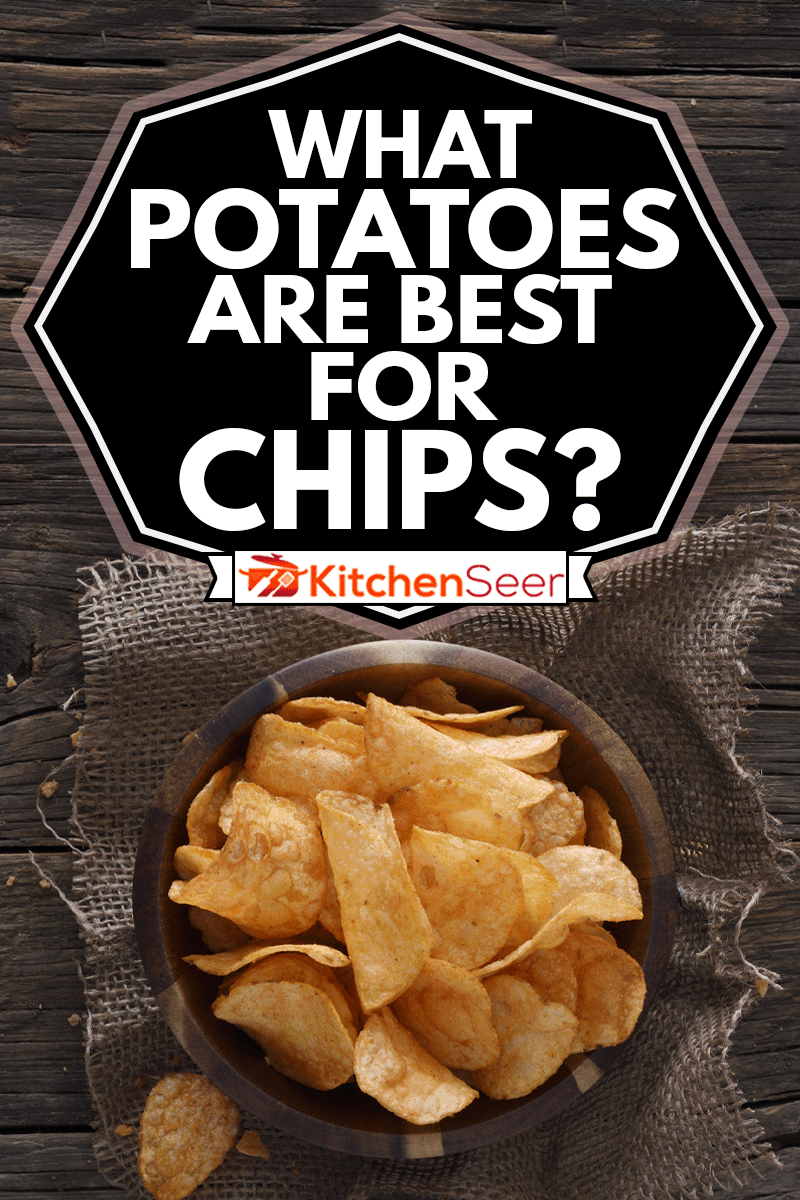
Popular Chip Recipes
If we discovered one thing when researching this post, we learned that there are a LOT of recipes and techniques for making homemade potato chips. But no matter the recipe, proper prepping can determine if your chips turn out crispy and delicious or soggy and subpar.
To prep, you'll first want to wash your potatoes in water thoroughly. Next, use a metal cheese grater to slice the potatoes thinly. This method will slice them thin enough to ensure crispiness. After slicing, place the slices into a bold of ice water for thirty minutes. When finished, drain the water and let the slices dry on layers of paper towel. Pat them dry with another layer of paper towels. They will now be ready for whatever recipe that you choose.
Below, we've taken several popular homemade potato chip recipes from various sources. Enjoy!
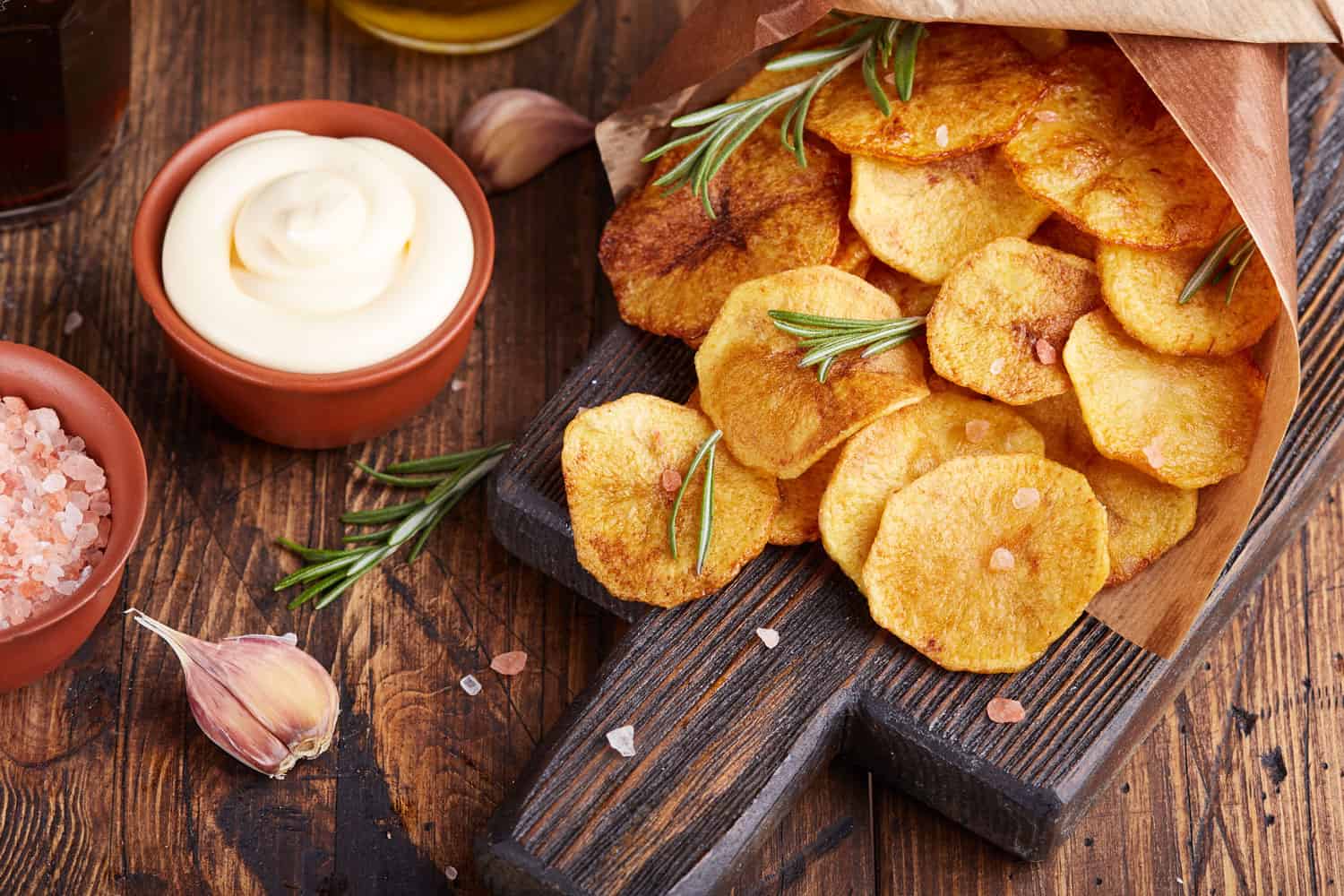
From TasteofHome.com:
In a cast-iron or other heavy skillet, heat 1-1/2 in. oil to 375°. Fry potatoes in batches until golden brown, 3-4 minutes, stirring frequently.
Remove with a slotted spoon; drain on paper towels. Immediately sprinkle with seasoning mixture.
From OurEveryDayLife.com:
Drop five to 10 slices of potato into the fryer at a time, depending on how big your fryer is. You want to make sure that the slices have plenty of room, so they don't clump together. Drop them gently, careful to watch out for any grease splatters to avoid burns.
Scoop the chips out of the fryer once they float to the surface. Lay the chips out on the paper-towel covered cookie sheet to dry. Sprinkle the drying chips with salt before placing another handful of sliced potatoes into the fryer.
Continue the above steps until all of your chips are fried.
Store your chips in a large plastic zipper bag to prevent them from going stale.
From AllRecipes.com:
Heat oil in a deep-fryer to 365 degrees F (185 degrees C). Fry potato slices in small batches. Once they start turning golden, remove and drain on paper towels. Continue until all of the slices are fried. Season with additional salt if desired.
What Are The Best Methods For Making Homemade Potato Chips?
Frying
Using a home fryer, like a "Fry Daddy," means making homemade chips fun, quick, and easy. This method makes for the crispiest chips if they are sliced thin enough. Your fryer can use almost any cooking oil, so you have the option of using healthier ones for your frying needs.
To see this model home deep fryer on Amazon, click here.
Baking
Consider baking your homemade chips if you want to avoid the excessive amount of oils used in deep frying. After the potatoes are thinly sliced, apply a light brushing of cooking oil to them, and bake for thirty minutes at 325 degrees. Rotate the baking sheet halfway through the baking cycle.
This method will get fairly crunchy chips, depending on how thinly you slice them. For optimal crispness, be sure to consume them on the same day that they are prepared.
Air frying
Air fryers have become a popular appliance in the last several years, with more and more home kitchens hosting these handy little devices. There are hundreds, if not thousands, of great recipes suited for air fryers, and making homemade potato chips with them are some of them.
Using an air fryer is quicker and easier than deep-frying and has less of a potential mess. You're also a lot less likely to burn yourself, as you won't have popping grease from one.
This is a great method for making crispy chips. Unlike baking, air frying your chips will allow them to stay crispy for several days.
To see this brand of air fryer on Amazon, click here.
What Is The Healthiest Oil For Frying?
When it comes to choosing oil to fry your potatoes in, you're going to be overwhelmed with options. Canola oil? Olive oil? Each one has its pros and cons, of course. But which is the healthiest oil for frying?
Health experts overwhelmingly choose coconut oil as the best oil for frying food like chips. While high in saturated fat, this oil has been shown to boost your HDL (good cholesterol) substantially. Coconut oil also contains lauric acid, which is excellent for increasing your metabolism and protecting brain health.
Granted, there are much healthier oils on the market for your body than coconut oil. Oils that contain unsaturated fats are better for boosting HDL and lowering ADL (bad cholesterol). Flaxseed oil, sesame seed oil, extra virgin olive oil, and grape seed oil are better cooking options. However, these oils won't fry potatoes well, which is why we are listing coconut oil as the healthiest option here.
If you want to avoid the most unhealthy oils for frying, health experts say to steer clear of canola oil, soybean oil, corn oil, and anything labeled as "vegetable oil." These oils are very high in polyunsaturated fats and hexane, both known to increase your ADL.
Do Old Potatoes Make Better Chips?
For the best tasting homemade chips, you want to be sure to use the freshest ones that are available. As potatoes age, they tend to lose moisture. This moisture is where the flavor is and also what makes chips fry better and crispier.
You'll definitely want to avoid using any potato that has sprouted. While it's still safe to eat the potato after removing the sprout growth, the presence of the sprouts will have changed the flavor a bit and would make it less suitable for homemade potato chips.
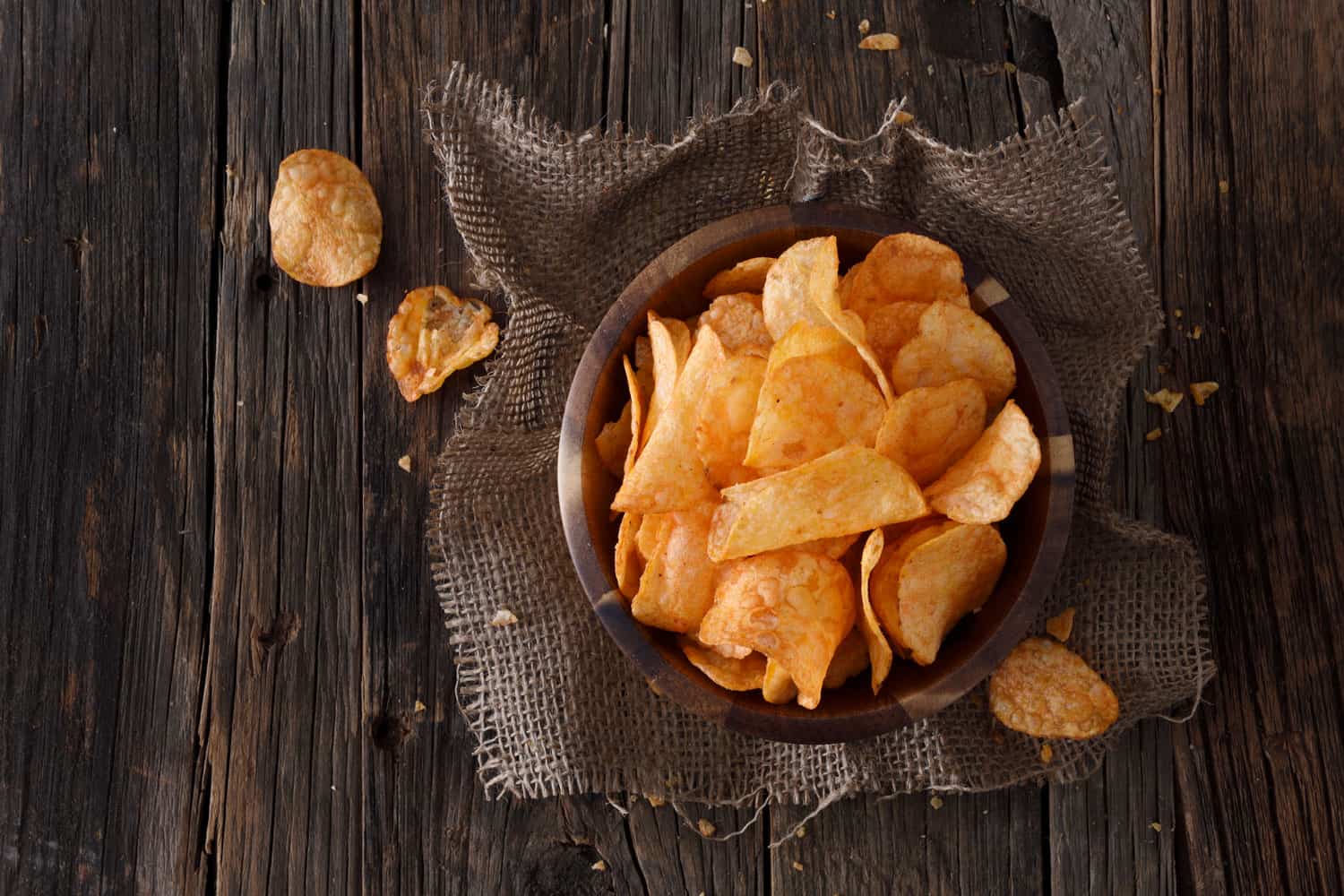
How Do You Make Homemade Chips Not Soggy?
If your chips are prepped, cooked, and stored correctly, you'll have chips that aren't soggy.
Begin by slicing the potatoes as thin as possible, with the maximum thickness no more than that of a dime. You'll then want to soak the slices in ice water for thirty minutes. Extremely cold slices going into hot oil will make your finished product much crisper when it's finished.
Storing your chips after you've allowed any excess grease to drain will keep them from getting soggy for up to ten days. Use a zip lock bag to store them, as airtight containers will lock in moisture and make your chips wither.
How Long Will Homemade Potato Chips Last?
Just how long a batch of homemade potato chips will last depends on several factors. How they are prepared, how thin and crisp the chips are, and how they are stored will significantly influence how crispy and fresh your chips are days after making.
For chips that are deep-fried or made in an air fryer, storage is key. After cooking, place the ones that won't be eaten immediately in a bowl lined with several layers of paper towels. Set another paper towel on top. This will absorb most of the excess cooking oils, which will speed up sogginess if left on the chips.
After an hour or so, place the chips in zip lock bags. This will keep the homemade chips fresh and tasting great for up to ten days. Avoid using airtight containers, as they will seal in moisture and cause the chips to soften.
If you baked your homemade chips, you want to try to eat what you make the same day. Chips made in this fashion do not hold their crispness as long. But baked chips are still as safe to eat after the same ten-day period as fried and air fried chips. Store them in zip lock baggies as well.
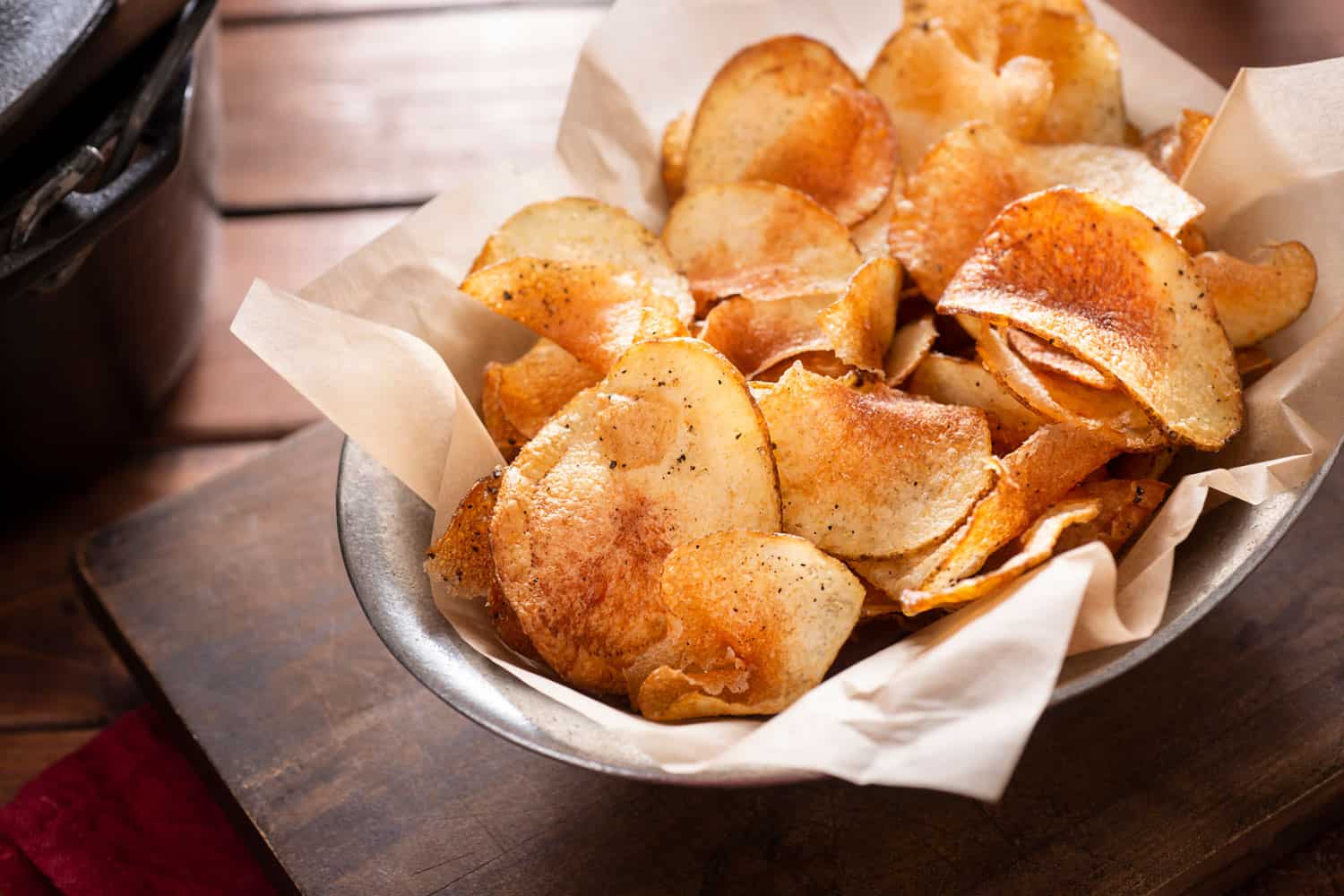
In Closing
Potato chips have been a staple snack for ages, and there are many recipes out there for you to try out at home. While you can use many different varieties to make homemade potato chips, other species of "old potatoes" tend to make much better ones.
Homemade potato chips can be made using several methods, including frying, air frying, and baking. For the crispiest homemade chip, frying has proven to be the best method. If you want to have a fried snack that's a little more healthy, coconut oil is the best option.
We also learned that there are several tricks to keeping your homemade chips from being getting soggy, as well as making them last in-between snacks. Keeping these tips in mind will make your supply of homemade treats taste better and last longer.
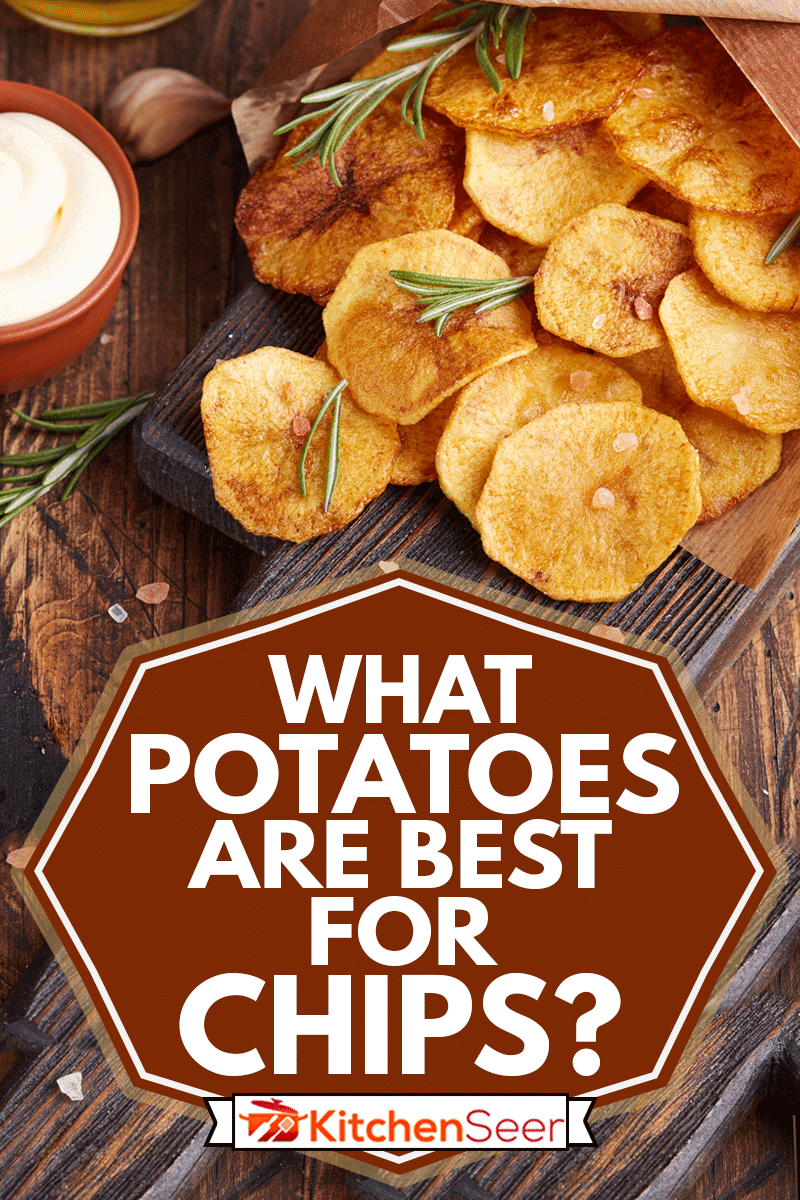
If you've enjoyed reading this post about homemade potato chips, we believe you'll like the following posts:
Should You Oil Potatoes Before Baking?
Can You Use a Food Processor To Slice Potatoes? [Here’s How To]



